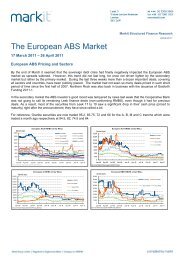The CDS Big Bang Research Report - Markit.com
The CDS Big Bang Research Report - Markit.com
The CDS Big Bang Research Report - Markit.com
You also want an ePaper? Increase the reach of your titles
YUMPU automatically turns print PDFs into web optimized ePapers that Google loves.
<strong>CDS</strong> <strong>Big</strong> <strong>Bang</strong>: Contract and Convention Changes<br />
Trading with a Full Coupon<br />
<strong>The</strong> Situation Today:<br />
Under the current convention, whether a protection buyer pays a coupon on the first coupon or IMM 5 date depends on<br />
when the trade occurred. IMM dates are the chosen termination dates for <strong>CDS</strong> contracts: March 20th, June 20th,<br />
September 20th, and December 20th for any given year.<br />
If the trade date falls before 30 days prior to the first coupon date, the accrual is due on the first coupon date for the<br />
number of days of effective protection during the period. This is called a “short stub” period. If the trade date is within 30<br />
days before the first coupon date, there is a “long stub period”. No accrual of premium is paid on this first IMM coupon<br />
date, rather the long stub is paid on the following coupon date. That payment would include the portion of premium<br />
owed for protection in the first period plus the full premium for the second period.<br />
This adds an extra level of <strong>com</strong>plexity to operations departments in setting up coupon payments. About 5% of the<br />
trades in the Trade Information Warehouse have not made a “first period” coupon. Currently, these trades are “long<br />
stub” (see diagram below). As such these positions can not be initially included in trade <strong>com</strong>pression, the process used<br />
to net single name <strong>CDS</strong> positions to reduce gross notional outstanding.<br />
Source: <strong>Markit</strong><br />
Confidential. Copyright © 2009, <strong>Markit</strong> Group Limited. All rights reserved. www.markit.<strong>com</strong><br />
<strong>The</strong> current process for accrual<br />
payments places a burden on<br />
operations. For the same credit and<br />
same maturity, the timing of the first<br />
premium payment depends on when<br />
in the quarter the trade is done.<br />
Under the new standard, full premium<br />
payments would always occur on the<br />
IMM payment date. Any<br />
“overpayment” by the protection<br />
buyer for the time in the period for<br />
which they did not hold the position<br />
would be paid by the protection seller<br />
at the time of the trade.<br />
This practice makes the <strong>CDS</strong> a bit<br />
more like a bond in the sense of how<br />
bonds treat accrued interest. That is,<br />
payments are dealt within the same<br />
period instead of shifting to the next<br />
period and the payment amounts are<br />
adjusted for the time in which the<br />
position is held during the first<br />
payment period. <strong>The</strong> <strong>com</strong>parison<br />
ends there though as a <strong>CDS</strong><br />
premium payment and a bond<br />
accrued interest payment are not<br />
alike.<br />
5 IMM dates are the chosen termination and payment dates for <strong>CDS</strong> contracts: March 20th, June 20th, September 20th, and<br />
December 20th for any given year. <strong>The</strong>y loosely correspond to the International Monetary Market (IMM) dates used in the Euromoney<br />
market, the third Wednesday of March, June, September, and December.<br />
17








